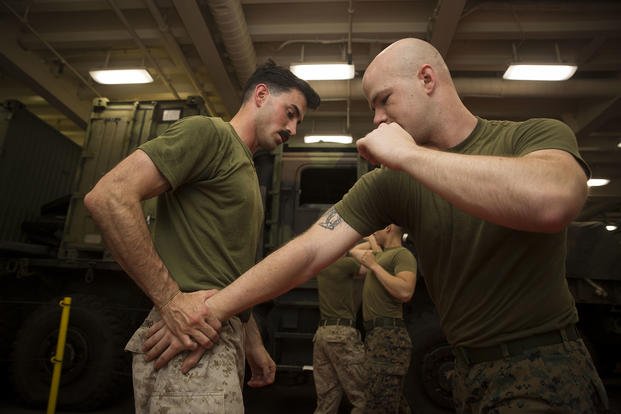Many of us joined the military thinking it would turn us into fighting machines that could take down an opponent with a simple pinky-twitch. We believed that, upon graduating boot camp, we would have to register ourselves with local police stations as lethal weapons, and all that awesomeness.
Yet, while the military may not have made the majority of us into fantasy-like ninjas, many service members leave the service with an advanced understanding of fighting techniques. This is especially true of Marines, who have been required to go through a Marine Corps Martial Arts Program (MCMAP) since 2001.
But how are these martial arts skills useful in the civilian world?
Competitions
For one, there are the one-off moments of glory that could lead on to bigger and better things. For example, this Veterans Day, the World Series of Fighting is doing a promotional fight with veterans as the fighters. Events such as this can lead to huge exposure and resume building (if you want to work in a related field), and we would hope they pay well.
Some veterans have gone on to be pro fighters, such as Liz Carmouche and the other UFC fighters featured in the Military.com article, "From Military to UFC: 10 Fighters Who Served." Going pro is a challenging way of life, but if this is your calling, leverage your military experience and discipline to make it happen.
Teaching at a Gym
When I left the Marines, I went on to teach kickboxing part time at LA Boxing (now UFC Gym). This was a fun way to make some extra spending cash, keep my skills up and make local friends. If you're new to an area and looking for a community, finding a gym to train at or teach at should be one of your top priorities. You will likely want to train on the side to make sure that your style matches up with what's being taught on the civilian side, because it is different from MCMAP and other military fighting programs.
If you want to make good money at the gym, consider personal training. Having private clients can earn you average rates of $20 to $100 an hour, and sometimes more.
Security Jobs
The typical career counselor will likely advise considering security jobs when you ask about using your fighting experience in the private sector. While this is valid advice, try to think outside the box a bit. I once met a veteran who had managed to work his way up to being a bodyguard for Tom Cruise. There are plenty of security, bouncer and bodyguard jobs that can leverage your experience as a hard-core guy or gal.
Hollywood Advising and Stunt Work
If working at a gym or being a bodyguard for a Hollywood star doesn't interest you, consider being a military adviser on movie sets. The pay can be nice, and the experience can be invaluable if you have aspirations for working in film.
Related to this, some people don't mind getting beat up all the time and therefore aspire to do stunt work for movies or television. A word of warning: You'll have to learn to fight the Hollywood way, which can feel quite silly to the experienced among us.
Whatever you decide to use your fighting skills for after the military, consider said skills as one more piece of the resume. You can stand out from the crowd with your military dedication and discipline, and an alumni network of fellow veterans. What's important is that you do what inspires you and keeps you motivated every day.
Find the Right Veteran Job
Whether you want to polish your resume, find veteran job fairs in your area or connect with employers looking to hire veterans, Military.com can help. Subscribe to Military.com to have job postings, guides and advice, and more delivered directly to your inbox.











